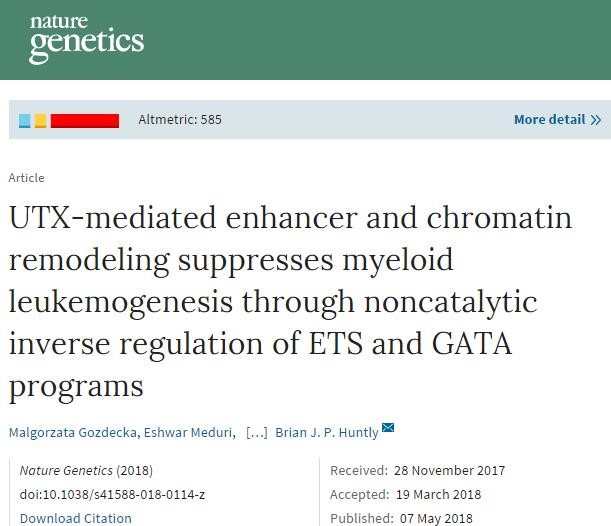Researchers from the Wellcome Sanger Institute and the University of Cambridge found the first protective gene against leukemia on the male Y chromosome, which prevents acute myeloid leukemia (AML) and other cancers. Related research published online in Nature Genetics.

In the study of how the deletion of the X chromosome gene UTX (a mutation known to occur in many tumors) accelerates the progression of AML, a related gene UTY on the Y chromosome can protect UTX-deficient male mice from AML. attack. The researchers then found that in AML and several other human cancers, the loss of UTX is often accompanied by a loss of UTY, thus confirming that the scope of UTY inhibition is not limited to AML.
A woman has two X chromosomes, while a male is an X chromosome and a Y chromosome. The X chromosome and the Y chromosome share many genes, but only a few genes such as UTY are found only on the Y chromosome. These Y-specific genes have long been thought to contain the genetic information needed for male sexual characteristics, but do not eliminate other aspects. This new discovery changes the inherent perception of the Y chromosome and helps researchers strengthen their understanding of AML and other cancer developments.
Dr. Malgorzata Gozdecka, the first author of the study and the Wellcome Sanger Institute, said: "This is the first Y-chromosome-specific gene for AML. It was previously thought that the only function of the Y chromosome is to express male sexual characteristics, but our findings indicate The Y chromosome also prevents AML and other cancers."
Professor Brian Huntly, head of the joint project at the University of Cambridge in the United Kingdom, said: "It is well known that men often lose Y chromosomes from their cells as they age. The significance of this is not clear. Our study strengthens the loss of Y chromosomes and may increase the risk of cancer. The argument and describe a mechanism for how this happens."
The researchers studied the UTX genes in human and mouse cells in an attempt to understand their role in AML. In addition to discovering the tumor suppressive effects of UTY, the experiment also found a new mechanism by which UTX deletions lead to AML production. They found that UTX can be used as a common scaffold to bring together a large number of regulatory proteins that control DNA pathways and gene expression. This function can also be performed by UTY. When UTX/or UTY is deleted, these proteins do not properly regulate gene expression, and cancer becomes more likely to occur.
Specifically, they found UTX as a common "scaffold" that aggregates a large number of regulatory proteins that control DNA and gene expression. This function can also be performed by UTY. When UTX or UTY is absent, these proteins do not properly regulate gene expression, and cancer growth is more likely to occur.
Dr. George Vassiliou, co-project leader of the Wellcome Sanger Institute, said that the treatment of AML has not changed for decades, and there is a great demand for new therapies. This research has helped us understand the development of AML and develop new ones for us. Drug targets provide clues to overcome leukemia. We hope that this research will provide new research ideas for treatment and improve the lives of AML patients.
Tetanus Toxoid Vaccine,Toxoid Vaccine,Hep B Immune Globulin,Immunoglobulin Injections
FOSHAN PHARMA CO., LTD. , https://www.fospharma.com